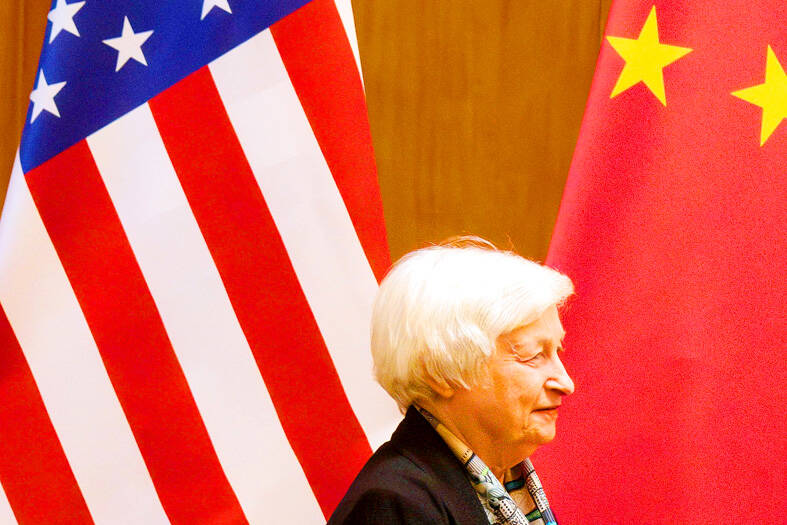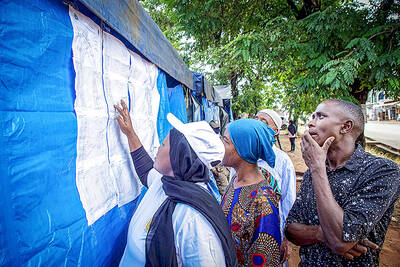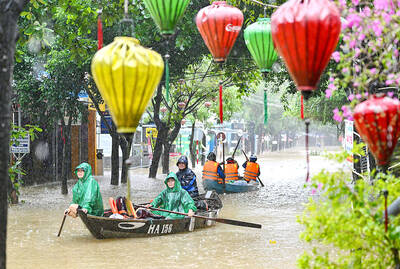It is “critical” for Washington and Beijing to keep working together on climate finance, US Secretary of the Treasury Janet Yellen said yesterday, urging deeper cooperation in addressing the “existential threat” of global warming.
Yellen is on a four-day trip to Beijing as the US seeks to cool tensions and stress areas of collaboration between the world’s two largest economies.
“As the world’s two largest emitters of greenhouse gases and the largest investors in renewable energy, we have both a joint responsibility — and ability — to lead the way,” Yellen told a roundtable of experts in China, underlining a key area of cooperation despite tense bilateral relations. “Climate change is at the top of the list of global challenges, and the United States and China must work together to address this existential threat.”

Photo: Reuters
Saying that “climate finance should be targeted efficiently and effectively,” she pressed China to support existing multilateral institutions such as the Green Climate Fund, while urging for the inclusion of the private sector in transitioning toward net zero emissions.
“Both our economies seek to support partners in emerging markets and developing countries as they strive to meet their climate goals, and I believe continued US-China cooperation on climate finance is critical,” she said.
China last year briefly said that it was suspending talks on the climate after Nancy Pelosi, then-speaker of the US House of Representatives, visited Taiwan.
However, there are signs that talks could restart soon, with US Special Presidential Envoy for Climate John Kerry due to travel to China to discuss cooperation on climate change, a US official said on Friday.
Besides meeting people involved in climate finance, Yellen is also expected to speak with economists and meet Chinese Vice Premier He Lifeng (何立峰), a key official in China’s economic affairs.
It is during these subsequent meetings that Yellen was expected to be able to drill down into more specific issues, ranging from the macroeconomy to trade and technology exports, said Lyu Xiang (呂祥), a Sino-US relations expert at the Beijing-headquartered Chinese Academy of Social Sciences.
However, a key question is whether “big ticket items that are in the category of global challenges,” such as debt distress and climate cooperation, get bumped to the top of the agenda, said Lindsay Gorman, senior fellow for emerging technologies at the Washington-based German Marshall Fund of the United States.
Yellen’s talks follow meetings with US businesspeople, who have expressed a host of concerns ranging from level playing fields with Chinese firms to reduced people-to-people exchanges and an uncertain business climate in the face of a national security crackdown.

With much pomp and circumstance, Cairo is today to inaugurate the long-awaited Grand Egyptian Museum (GEM), widely presented as the crowning jewel on authorities’ efforts to overhaul the country’s vital tourism industry. With a panoramic view of the Giza pyramids plateau, the museum houses thousands of artifacts spanning more than 5,000 years of Egyptian antiquity at a whopping cost of more than US$1 billion. More than two decades in the making, the ultra-modern museum anticipates 5 million visitors annually, with never-before-seen relics on display. In the run-up to the grand opening, Egyptian media and official statements have hailed the “historic moment,” describing the

‘CHILD PORNOGRAPHY’: The doll on Shein’s Web site measure about 80cm in height, and it was holding a teddy bear in a photo published by a daily newspaper France’s anti-fraud unit on Saturday said it had reported Asian e-commerce giant Shein (希音) for selling what it described as “sex dolls with a childlike appearance.” The French Directorate General for Competition, Consumer Affairs and Fraud Control (DGCCRF) said in a statement that the “description and categorization” of the items on Shein’s Web site “make it difficult to doubt the child pornography nature of the content.” Shortly after the statement, Shein announced that the dolls in question had been withdrawn from its platform and that it had launched an internal inquiry. On its Web site, Le Parisien daily published a

UNCERTAIN TOLLS: Images on social media showed small protests that escalated, with reports of police shooting live rounds as polling stations were targeted Tanzania yesterday was on lockdown with a communications blackout, a day after elections turned into violent chaos with unconfirmed reports of many dead. Tanzanian President Samia Suluhu Hassan had sought to solidify her position and silence criticism within her party in the virtually uncontested polls, with the main challengers either jailed or disqualified. In the run-up, rights groups condemned a “wave of terror” in the east African nation, which has seen a string of high-profile abductions that ramped up in the final days. A heavy security presence on Wednesday failed to deter hundreds protesting in economic hub Dar es Salaam and elsewhere, some

Flooding in Vietnam has killed at least 10 people this week as the water level of a major river near tourist landmarks reached a 60-year high, authorities said yesterday. Vietnam’s coastal provinces, home to UNESCO world heritage site Hoi An ancient town, have been pummeled by heavy rain since the weekend, with a record of up to 1.7m falling over 24 hours. At least 10 people have been killed, while eight others are missing, the Vietnamese Ministry of Natural Resources and Environment said. More than 128,000 houses in five central provinces have been inundated, with water 3m deep in some areas. People waded through